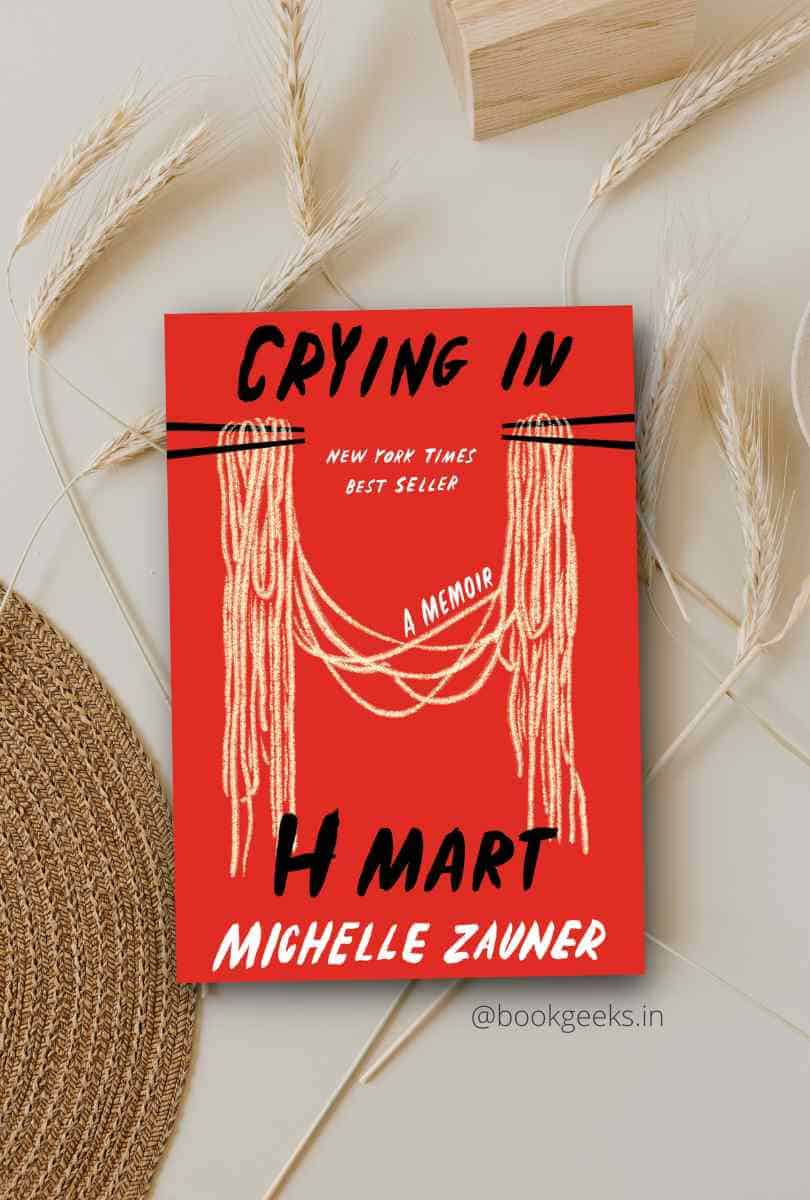CONCEPT/THEME: 5/5 WRITING: 4.5/5 CANDIDNESS: 4.5/5 OVERALL: 4.5/5
“In fact, she was both my first and second words: Umma, then Mom. I called to her in two languages. Even then I must have known that no one would ever love me as much as she would.”
― Michelle Zauner, Crying in H Mart
It’s the name that manages to get your attention first. Then it’s the striking cover, then the blurb, and then the fact that this book won the Goodreads Choice Award for the best memoir and biography in 2021. Crying in H Mart has been all over the internet, especially so in the last year. I, however, decided to pick it up months later only to regret not reading this gem of a book sooner.
Born in Seoul, South Korea, Michelle is a singer and guitarist best known for her indie pop music which she creates through her band Japanese Breakfast.
Crying in H Mart is a memoir about grief and loss, about growing up Korean American, about trying to find your roots in a reality that is constantly shifting. It’s a book about losing oneself and about finding oneself too.
After the death of her mother, Michelle understood what being truly loved meant. The link to her Korean roots (and the love-filled Korean food) that had kept her rooted all these years was suddenly gone. Born to a Korean mother and Caucasian father, finding her legacy had never been easy, but with her mother around, it was a comfortable journey to navigate.
She talks of growing up in small-town America in a place called Eugene in Oregon, where she was amongst the few Asian American kids in her town, where she never really fit in. Neither in the typical American schoolgirl way nor in the quintessential Korean kid way, always meandering her way through two cultures completely in contrast with one another.
She writes of her mother, her love, care, and her particularly high expectations as an Asian mom; of her troubling adolescence when she emerged as the rebellious kid; of the many summers and many months she spent at her grandmother’s crampy apartment in Seoul, absorbing everything that the city had to offer, but also taking in the culture that made her mother. She writes of the sumptuous meals and the messy language exchanges; of the midnight binge-snacking and the loud family games; of the crowded markets and the many wonders that Korean cuisine has to offer.
When Michelle was just a kid, how she would do everything in her capacity to please her mom, how she would look for the smallest of opportunities to garner praise from her, but as she got to her rebellious phase, she started distancing herself, until this distance started erasing her very Korean-ness.
It was not until her mother’s diagnosis of terminal cancer that Michelle paused to reflect on her current and future reality; when she paused to ponder about her identity, her roots, and legacy, the taste, language, history, and culture that made her who she was.
The book is a heart-warming and sometimes tear-inducing account of Michelle’s life and the special bond that she shared with her mother. The careful descriptions and loving memories that she so passionately captures in these 250-odd pages make her mother feel like a larger-than-life character. A character who is so distant, so foreign, and yet so relatable. It is her writing that truly captures, no celebrates, the wonderful life that was her mother.
As an Indian reader, there was a lot to relate to in Crying in H Mart. How the very idea of family revolves around food, how food is not just a source of energy and nourishment but the very celebration of life, how Asian parents (Indians included) can be very micro-managing, trying to control every bit of your life, always pushing you to do better, showing disappointment when things don’t go according to the high expectations that they have set for you.
But despite all that, how Asian parents, no matter how strict they are, would always be around for the smallest of your needs, how they would selflessly sacrifice their own desires and needs if that means just a little bit more for their child.
Hers was tougher than tough love. It was brutal, industrial-strength. A sinewy love that never gave way to an inch of weakness. It was a love that saw what was best for you ten steps ahead, and didn’t care if it hurt like hell in the meantime. When I got hurt, she felt it so deeply, it was as though it were her own affliction. She was guilty only of caring too much. I realize this now, only in retrospect. No one in this would ever love me as much as my mother, and she would never let me forget it.”
Perhaps that’s the thing that hurts you the most, the loss of a parent. The loss of Michelle’s mother in the book feels like a personal loss. It’s heartening to see how hard she tries for it to work, to shower her mother with just a tiny fraction of the love that was showered on her her whole life.
“It felt like the world had divided into two different types of people, those who had felt pain and those who had yet to.”
The writing is emotionally charged and intensely passionate; Crying in H Mart is a beautiful tribute to a lovely mom. The title might not make much sense to you until you decide to give this a read but once you do, I am sure, you will not come to regret it.
Cannot wait to read it? Buy your copy of Crying in H Mart using the link below.
